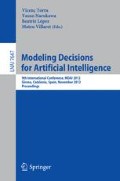Abstract
We promote a useful representation of fuzzy sets by ordinary sets, called the Cartesian representation. In particular, we show how the main structures related to a general type of concept lattices may be reduced using this representation to their ordinary counterparts. As a consequence of this representation, we obtain a simple proof of the basic theorem for this type of concept lattices.
We acknowledge support by the Grant No. P202/10/0262 of the Czech Science Foundation (Belohlavek, Konecny, Osicka) and by IGA of Palacky University, No. PrF_20124029 (Konecny, Osicka).
Access this chapter
Tax calculation will be finalised at checkout
Purchases are for personal use only
Preview
Unable to display preview. Download preview PDF.
References
Bandler, W., Kohout, L.J.: Semantics of implication operators and fuzzy relational products. Int. J. Man-Machine Studies 12, 89–116 (1980)
Bartl, E., Belohlavek, R.: Sup-t-norm and inf-residuum are a single type of relational equations. Int. Journal of General Systems 40(6), 599–609 (2011)
Belohlavek, R.: Fuzzy Galois connections. Math. Logic Quarterly 45, 497–504 (1999)
Belohlavek, R.: Lattices of fixed points of fuzzy Galois connections. Math. Logic Quarterly 47(1), 111–116 (2001)
Belohlavek, R.: Reduction and a simple proof of characterization of fuzzy concept lattices. Fundamenta Informaticae 46(4), 277–285 (2001)
Belohlavek, R.: Fuzzy Relational Systems: Foundations and Principles. Kluwer, Academic/Plenum Publishers, New York (2002)
Belohlavek, R.: Concept lattices and order in fuzzy logic. Annals of Pure and Applied Logic 128(1-3), 277–298 (2004)
Belohlavek, R.: Optimal decompositions of matrices with entries from residuated lattices. J. Logic and Computation (September 7, 2011), doi: 10.1093/logcom/exr023
Belohlavek, R.: Sup-t-norm and inf-residuum are one type of relational product: unifying framework and consequences. Fuzzy Sets and Systems 197(16), 45–58 (2012)
Belohlavek, R., Vychodil, V.: What is a fuzzy concept lattice? In: Proc. CLA 2005, 3rd Int. Conference on Concept Lattices and Their Applications, pp. 34–45 (2005)
Belohlavek, R., Vychodil, V.: Formal concept analysis and linguistic hedges. Int. J. General Systems 41(5), 503–532 (2012)
Birkhoff, G.: Lattice Theory, vol. 25. AMS Colloq. Publ. (1940)
Davey, B.A., Priestley, H.A.: Introduction to Lattices and Order. Cambridge University Press (2002)
Ganter, B., Wille, R.: Formal Concept Analysis. Mathematical Foundations. Springer, Berlin (1999)
Gediga, G., Düntsch, I.: Modal-style operators in qualitative data analysis. In: Proc. IEEE ICDM 2002, pp. 155–162 (2002)
Georgescu, G., Popescu, A.: Non-dual fuzzy connections. Archive for Mathematical Logic 43, 1009–1039 (2004)
Goguen, J.A.: L-fuzzy sets. J. Math. Anal. Appl. 18, 145–174 (1967)
Gottwald, S.: A Treatise on Many-Valued Logics. Research Studies Press, Baldock (2001)
Hájek, P.: Metamathematics of Fuzzy Logic. Kluwer, Dordrecht (1998)
Kohout, L.J., Bandler, W.: Relational-product architectures for information processing. Information Sciences 37, 25–37 (1985)
Kohout, L.J., Kim, E.: The role of BK-products of relations in soft computing. Soft Computing 6, 92–115 (2002)
Krajči, S.: The basic theorem on generalized concept lattices. In: Proc. CLA 2004, pp. 25–33 (2004)
Krajči, S.: A generalized concept lattice. Logic J. of IGPL 13, 543–550 (2005)
Medina, J., Ojeda-Aciego, M., Ruiz-Claviño, J.: Formal concept analysis via multi-adjoint concept lattices. Fuzzy Sets and Systems 160, 130–144 (2009)
Morsi, N.N., Lotfallah, W., El-Zekey, M.S.: The logic of tied implications, part 1: Properties, applications and representation; part 2: Syntax. Fuzzy Sets and Systems 157, 647–669, 2030–2057 (2006)
Ore, O.: Galois connexions. Trans. Amer. Math. Soc. 55, 493–513 (1944)
Pollandt, S.: Fuzzy Begriffe. Springer, Berlin (1997)
Ward, M., Dilworth, R.P.: Residuated lattices. Trans. Amer. Math. Soc. 45, 335–354 (1939)
Zadeh, L.A.: Fuzzy sets. Information and Control 8, 338–353 (1965)
Author information
Authors and Affiliations
Editor information
Editors and Affiliations
Rights and permissions
Copyright information
© 2012 Springer-Verlag Berlin Heidelberg
About this paper
Cite this paper
Belohlavek, R., Konecny, J., Osicka, P. (2012). Simple Proof of Basic Theorem for General Concept Lattices by Cartesian Representation. In: Torra, V., Narukawa, Y., López, B., Villaret, M. (eds) Modeling Decisions for Artificial Intelligence. MDAI 2012. Lecture Notes in Computer Science(), vol 7647. Springer, Berlin, Heidelberg. https://doi.org/10.1007/978-3-642-34620-0_27
Download citation
DOI: https://doi.org/10.1007/978-3-642-34620-0_27
Publisher Name: Springer, Berlin, Heidelberg
Print ISBN: 978-3-642-34619-4
Online ISBN: 978-3-642-34620-0
eBook Packages: Computer ScienceComputer Science (R0)

